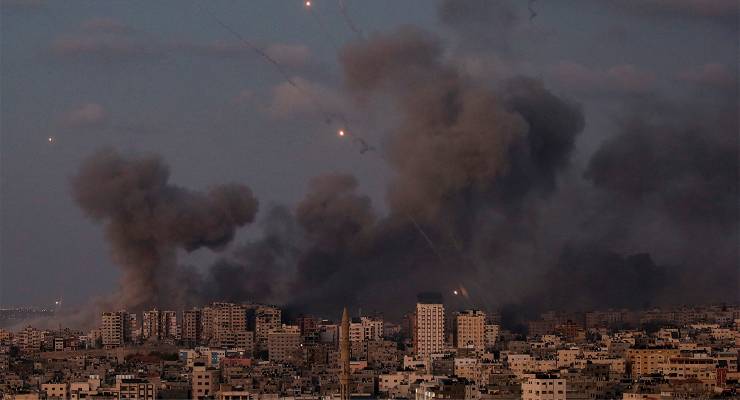
In the Jewish tradition, when a person dies, there is a mourning period called “sitting shiva”. A shiva is the mourning process that involves detaching from the world for a week. Mourners rend their clothes, sit on low chairs, and spend the week gathered in the home of the deceased to remember and share stories of their loved ones.
This week in Israel, after more than 1,300 were killed by Hamas in a level of brutality that words can’t describe, almost an entire country is sitting shiva. In a small piece of land by the Mediterranean Sea where almost everyone knows everyone, with one degree of separation, we all feel connected to the innocent civilians, including young children and babies who were murdered or kidnapped.
Following the October 7 massacre, Defence Minister Yoav Gallant announced a “complete siege” of Gaza: “There will be no electricity, no food, no fuel, everything is closed.” Israeli human rights lawyer Michael Sfard noted in response that adopting a method of warfare that includes starving Gazans and letting them go thirsty is in no way legal or moral. Indeed, its effects have already caused a catastrophic humanitarian crisis in Gaza.
At times like this, it’s almost impossible to talk about peace. How can one talk about compromise and justice in the face of such brutality from Hamas and such collective punishment in Gaza? The goal of organisations such as the one where I work, Kids4Peace Jerusalem, is to provide meaningful dialogue programs for Jewish, Muslim and Christian children together, with the express purpose of humanising them to one another. However, at this time, we are surrounded by an enormous mass of inhumanity, fear, anger and sadness.
Inspiringly, the Jerusalem Hand in Hand school for Jewish and Arab children responded to this grief on social media: “A war like this could tear us apart, but it won’t. Raising children to see the humanity of one another is the only way to change our world. It is the only path to ensure that our collective fate may be one of safety, peace and equality for all.”
Many would disagree with the statement, as the deep-seated hatreds here run very deep as a result of the enormous pain we have caused one another.
Ultimately, there can be no peace with the leaders of Hamas such as Mohammed Deif, the secretive mastermind behind the assault, or Yahya Sinwar, the leader of Hamas in Gaza. They must be brought to justice.
And whether in a two-state, confederation or one-state format, there can also be no peace until the Netanyahu government enables the Palestinians to have all the freedoms and rights enjoyed by Israelis.
In the coming days, months and even years, there will likely be even more suffering and bereaved parents in Gaza, as Israel will continue doing what it feels it must to prevent Hamas from harming Israeli citizens in such an obscene manner ever again.
Yet after the war ends, like all wars do, the leaders of both nations, whoever they may be at that time, must find a way to talk and listen to one another to build a shared future.
To reach that day, Israelis and Palestinians must do all they can to see each other as human, and especially to feel the pain of one another. In weeks like this, it feels like an impossible ask, although this already happens in many Jerusalem hospitals, where it’s quite common to hear Hebrew and Arabic spoken in the same wards, and in many workplaces and social initiatives that happen across the country.
For supporters of Israel and Palestine in Australia, beyond the cathartic street demonstrations and prayer gatherings for their respective people, they can also open themselves to hearing the personal stories of those who believe another way is possible. These include bereaved Palestinian parent Bassam Aramin, who shared on a recent speaking tour in Melbourne that “What Israelis want is security after 3,000 years of victimhood. What Palestinians want is freedom.” He added that “Israel will never be secure until there is freedom for the Palestinians. There will be no freedom for the Palestinians until there is security for Israelis.”
When we are experiencing such immense grief and pain, it’s instinctive to be tribal and nationalistic, to want an eye for an eye. Yet at this time, what must be even more important should be that other biblical imperative: Do not do unto others, what is hateful to you.








Crikey encourages robust conversations on our website. However, we’re a small team, so sometimes we have to reluctantly turn comments off due to legal risk. Thanks for your understanding and in the meantime, have a read of our moderation guidelines.